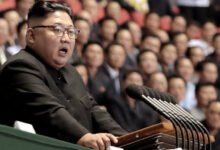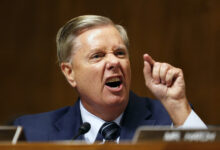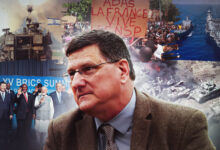
NATO foreign ministers grappled with Western commitment to the conflict during a key meeting in Brussels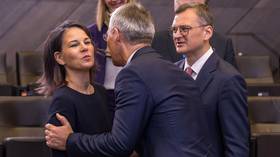

NATO Secretary-General Jens Stoltenberg (C) greets German Foreign Minister Annalena Baerbock (L) as Ukrainian Foreign Minister Dmitry Kuleba (R) looks on. © Omar Havana / Getty Images
Dwindling public attention to the Ukraine conflict will be “fatal,” German Foreign Minister Annalena Baerbock has said, in the run-up to a key NATO meeting in Brussels on Wednesday.
The first meeting of the NATO-Ukraine Council on the level of foreign ministers took place amid a “stalemate” on the frontline, as described by the top Ukrainian general, Valery Zaluzhny, earlier this month. Dmitry Kuleba, Kiev’s top diplomat, rejected the assessment ahead of the meeting.
Western fatigue with Ukraine and its problems topped the agenda during the session, but according to German news program Tagesschau, the ministers offered no concrete solutions.
“The view of Ukraine is currently disappearing from the public – that is fatal,” Baerbock warned, as quoted by the German Foreign Ministry on social media.
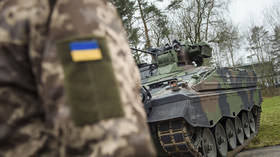

Read more
“We all have to work to further extend the winter protection umbrella for Ukraine,” she added, referring to bolstering Ukraine’s air defenses against Russian attacks.
A short communique released by NATO after the meeting said the council has “proven to be a reliable crisis consultation mechanism.” Ukraine and members of the bloc are developing “a roadmap for Ukraine’s transition to full interoperability with NATO” – that is, switching Ukraine from Soviet to Western weapons and military tactics.
Western media has reported numerous complaints by Ukrainian troops that the training they receive from NATO states is not applicable to the conflict with Russia.
Kuleba reiterated Kiev’s pitch for unrestricted support of his nation, touting the Ukrainian army as a proxy force prepared to sacrifice their lives fighting against the Russians.
“The best way to avoid sending your own soldiers into a war is to help another country fight its own war,” the minister told the press. “This is what makes us very different from others. Our deal is very fair. You give us all we need, we fight.”
READ MORE:
NATO recognizes Ukrainian counteroffensive has failed – member state
The premise that Ukraine serves as a shield for Europe was openly criticized by Hungary, which has refused to send arms to Ukraine and has been pushing for a negotiated truce. Foreign Minister Peter Szijjarto called Kiev’s claim “an exaggeration,” and said Budapest rejects any approach to the conflict based on this notion. “This is not our war,” he added.
